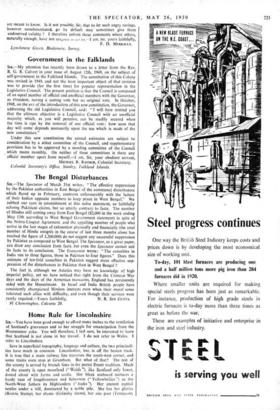Home Rule for Lincolnshire
Sru,—You have been good enough to afford many inches to the ventilation of Scotland's grievances and to her struggle for emancipation from the Westminster yoke. You will therefore, I feel sure, be interested to learn that Scotland is not alone in her travail. I do not refer to Wales. I refer to Lincolnshire.
Save in superficial topography, language and culture, the two principali- ties have much in common. Lincolnshire, too, is off the beaten track. It is true that a main railway line traverses the south-west corner, and some trains even stop at Grantham. But what of that? The rest of the county is served by branch lines in the purest Emett tradition. Much of the county is open moorland ("Wolds"), like Scotland only lower, dotted about with farms and crofts. Her bleak seaboard nurtures a hardy race of longshoremen and fishermen (" Yellowbellies ") as the North-West fathers its Highlanders (" Jocks "). Her ancient capital nestles under a hill, dominated by a noble pile. She has her glories (Boston Stump), her shame (Griinsby slums), her one poet (Tennyson), her outlandish speech (indescribable), and she has her bridge—or would have but for the indifference of the English Parliament. The Humber bridge was in the air before Scotsmen were taught to wear trousers. Only since the late North British Railway Company put ideas into their heads have the Scots hungered for a road bridge over the Forth.
Lincolnshire suffers much the same sort of ignorance about her geography: " Grimsby? Ah yes, Yorkshire." " But it's all fens! " For many an Englishman, his country ends at the Wash. So you see, Sir, others have their troubles, their aspirations, their fight for self-deter- mination. But if I were asked to distinguish, in a word, Scotsmen and Lincolnshiremen, I should say that Lincoln breeds a race of strong
silent men.—I am, Sir, yours faithfully, J. W. STORR.







































 Previous page
Previous page